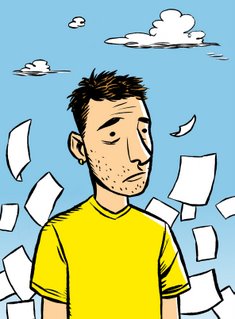
- How did you begin in the world of comics? What did it take you to it?
I've been doing comics since I was old enough to hold a crayon. I don't know why I've always been so obsessed with them - maybe it's due to my Dad, who brought me up on a healthy diet of Carl Barks, Herge, Crumb, Schulz, etc... By the time I was a teenager, I could rationalize it like this: I want to write and I want to draw; comics allows me to do both. I was doing strips for magazines by the time I was 14 and just kept on doing them. In the early 1990s, Michel Vrana (aka Black Eye) was publishing my first full solo comic book, Pickle, which ran for 10 issues and serialised Hicksville. I've been full-time as a cartoonist since 1995.
- Which are your maxims influences?
Too many to list, really. I guess the ones who've been important throughout my life have been: Herge, Charles Schulz, Carl Barks, Tove Jansson, Robert Crumb.
- Your more important work so far, winner of several prizes is Hicksville .Tell us something of this comic, How the idea arose etc...
Hicksville started out as an idea I had when I was living in London (UK). I missed my home (New Zealand) terribly, and so, just to comfort myself, I created an imaginary NZ town called Hicksville, which exemplified everything I missed about home. I came up with the character of Mrs. Hicks, who served as the editor and publisher of my minicomics (I used to put a little 'Hicksville Press' logo on the back of them). Then, when I was back in New Zealand, working on Pickle, I started the story Hicksville as a serial, with no idea where the story was going - I just felt like exploring that imaginary town some more. As it evolved in the first few episodes, I gradually began to see where the story was going - and soon it all fell into place. When I was eventually assembling the whole thing as a book, I redrew a lot of that first section, to better reflect where I now knew it was all going.
The intention of the story, I guess, is to create a kind of "turangawaewae" for people who love comics. Turangawaewae is a maori word meaning, literally, a place to stand. It describes a kind of spiritual home - the place you return to when you need to recharge your batteries and feel like you belong.
But the story is also about New Zealand - it's about ways people respond when they live at the edge of the world. In a sense, comics and New Zealand are both at the margins: NZ is geographically on the edge of the world, while comics are figuratively at the margins of art & literature & culture. My response to that is not to try to move closer to the so-called "centre". After all, the world is a sphere - so any point on the surface can serve just as well as the centre. So instead I choose to stay exactly where I am, and to treat that as MY centre of the world. Comics and NZ - those, for me, are the two locations from which I look out at the world. And Hicksville is all about drawing your own map of the world - and of reality.
- What would you tell to the Spanish readers to encourage them to read this comic?
Hell, I dunno. I'm constantly amazed that anyone reads it! All I can say is that people who love comics often seem to enjoy Hicksville - I guess because it's kind of a love letter to comics as a whole.
- A while ago you did begin the "continuation" of Hicksville, Atlas How you take it?
Well, it's been a slow process, but Atlas is intended as about a 1000-page story, which explores the life of Emil Kopen, a character who appears briefly in Hicksville. Kopen is a cartoonist and cartographer from a (fictitious) country in the Balkans. One issue has come out so far, from Drawn & Quarterly, and issue 2 is currently on my drawing board. You can find out more on my website: www.hicksville.co.nz
Meanwhile, I'm also working on a graphic novel for Top Shelf, which is a kind of pornographic love story involving secrets, comics and - well, all my usual topics, really.
- At the moment you are taking charge of several series for DC Comics. Tell us which and how do you feel in this works. Which other projects have carried out for big editorials?
I'm currently writing the monthly Batgirl comic for DC, which is fun - and helps pay the rent. Before that, I wrote Hunter: the Age of Magic for Vertigo for two years. Hunter was a spinoff from Neil Gaiman's The Books of Magic - imagine an 18-year old Harry Potter type character (being 18, he got to go to parties and have sex, etc - so it was a lot of fun to write).
It is interesting writing mainstream stuff like that for the big companies - quite aside from the fact that it pays the bills. It gives me a really fascinating inside look at the American comics industry. But ultimately, it is work for hire - and there's only so much satisfaction you can get from that. It could never replace what I do in my own books. Luckily, I've worked with some really great people on the DC books, including Richard Case (who drew Hunter) and Rick Leonardi (who's currently drawing Batgirl). It's fun - but it's also hard work.

No hay comentarios:
Publicar un comentario